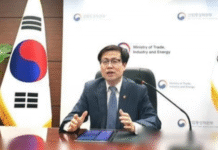NEW DELHI— The recently signed India-UK Free Trade Agreement (FTA) represents not only a major reduction in trade barriers—covering 90% of tariff lines—but also a significant strategic shift in global economic alignment, according to a new report from the State Bank of India (SBI).
The FTA is seen as a pivotal move that helps India bypass reliance on China, navigate U.S. tariff complexities, and align more closely with a post-Brexit UK. It comes as bilateral trade between India and the UK reaches $60 billion, with projections to double by 2030.
According to SBI’s Economic Research Department, the agreement covers goods, services, and technology, aiming to drive inclusive growth, boost resilient supply chains, and generate employment.
The deal opens new opportunities for Indian exporters in labor-intensive sectors such as textiles, toys, marine products, and auto components, thanks to market liberalization in the UK’s IT, finance, education, and consumer goods sectors.
Although broader immigration policies remain unchanged, the FTA allows limited professional mobility—issuing around 1,800–2,000 annual visas for chefs, musicians, and yoga practitioners—blending economic objectives with cultural diplomacy.
Key features include enhanced access to telecom and renewable energy sectors, streamlined digital trade, a focus on green goods, reciprocal social security agreements, and UK access to Indian public procurement as Class-2 suppliers.
India is also pursuing FTAs with the EU, Australia, Peru, Sri Lanka, and Oman, while reviewing existing agreements with South Korea and ASEAN—part of a broader overhaul of its trade strategy.
“The India-UK FTA is more than a transactional pact; it reflects a broader evolution in global trade philosophy—where strategic liberalism aligns national interests with long-term global partnerships,” the SBI report stated.
India has signed 13 FTAs to date, signaling its growing ambition to reshape trade policy in alignment with shifting geopolitical dynamics. (Source: IANS)








